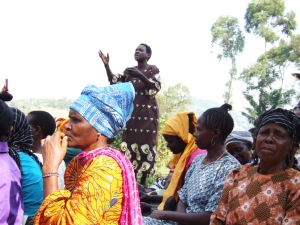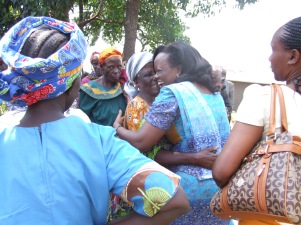This guest blog has been written by Lucy Barnett from the UK. Lucy is spending a month with ECAW researching for a Masters Dissertation into how grassroots organisations are engaging local communities to end harmful traditional practices that affect the girl child such as female genital cutting (FGC, also know as mutilation, or FGM) and child marriage.
Last Sunday I had the privilege of attending a baraza, a local community forum called by ECAW. The forum was held in Maeta, a village in Kuria East, forty minutes on motorbike from the main town, along dusty roads. We dropped by Dennitah’s mum house for a quick lunch, and from there processed on foot. Dennitah, Dennitah’s mum, the ECAW staff, a few family and friends, and myself all walked the 200 metres round the corner, greeted by locals all wanting to greet Dennitah and shake her hand. Dennitah Ghati is a well respected and celebrated woman in Maeta, having gone onto great things. She is a Member of Parliament and Women’s Representative for Migori Country. Having grown up in Kuria where her mum still lives, she knows well the challenges that locals, particularly women, have to overcome on a daily basis. She has encountered the same obstacles that girls continue to face in this traditional and isolated corner of Kenya.
Having emerged as a leader, Dennitah has returned to support the community in its development, recognising the high returns to be had by investing in women. Down the road and turn left, we arrived at a large open field where large numbers were gathered. We were greeted with an incredible scene: ululations and dancing from the women who were delighted to see Dennitah and hear her speak. Dressed in their Sunday best of bright prints and suits for some of the men, the women danced and clapped and hugged one of their own, returned from Nairobi to support local opportunities and empower their girls.
After the celebrations, hundreds of people sat, the women grouped at the front and the men behind them, listening intently to what Dennitah had to say. She was joined by the Village Elder and the District Commissioner. These are the local politicians who had been called by ECAW to engage with the community members during this baraza. They were there to raise awareness on a range of issues, to listen to local issues, and to offer advice and respond to questions. Such discussions are vital for accountability and for aiding communications. This is especially important in a region like Kuria where internet and radio is limited and television and newspapers a luxury – news and policy therefore is not easily be disseminated from government outwards.
The community was informed about the availability of financial support for widows and the elderly and of a scheme for women and youth to access government micro-loans in order to set up small businesses. This kind of information is essential for women without a good level of education are reliant on husbands and family members to support them. Following these talks, the floor opened up to local people to raise their concerns and ask questions.
It was amazing to see people so empowered to speak up and hold their local leaders to account. When ECAW started working here, and as is still the case in many communities, women simply did not raise their voices in public discussions. Yet here they were crowding at the front, their hands raised, eager to speak. One woman who stood-up to speak was visibly empowered and inspired by Dennitah’s example of leadership. She praised ECAW’s work around empowering girls in their community and pressed on her community the need to put greater value on girls’ education. Speaking articulately and with conviction, she pointed to her daughters – one currently in a local secondary school, the other who had gone on to study at university. She called on women in the community not to shy away from hard work, but to support their daughters to stay in school to enable economic and social opportunities to be opened for them.

A woman is inspired to articulate the positive impacts of not having girls cut and allowing them to stay on in education
One of the issues raised at the forum was harmful traditional practices. A middle-aged man stood up and stated his confusion that at national level, politicians were calling on Kenyans to hold on to their traditions, and yet here was ECAW and a local MP along with local administration speaking against their custom of FGC. Dennitah explained that some local customs like FGC are detrimental, and that they must work to uphold positive customs and let go of negative ones which hold girls and local development back. She spoke on the consequences of FGC and emphasised the need to invest in the girl child as a way to support local development.
What was clear is that there is ever a need to educate people to realise for themselves that FGC is not a positive cultural norm. Dennitah and her team of local paralegals are the ideal people to share this information. Afterall, Dennitah has been voted in locally to represent the people of Kuria. ECAW is well-regarded in the community, and has the necessary local understanding to best articulate a message that serves local needs. Community forums such as this one are empowering local people by giving them the full knowledge to enable them to come to their own decision that neither female genital cutting, nor taking girls out of school, serves either the girls or the wider community.

